şÚÁĎłÔąĎÍřwas once known by many as “the little college by the sea.” Today, the sea is still a big part of Dal’s identity but the university’s reach and impact stretches regionally, nationally and, increasingly, internationally.
Some of that can be seen in Dal’s changing student population: the university attracts more than three times as many international students as it did at the turn of the century, and today more than 13 per cent of Dal’s student body comes from outside of Canada. Dal students take advantage of global opportunities as well: last year, 443 şÚÁĎłÔąĎÍřstudents participated in study abroad programs in 120 receiving institutions across 44 different countries. At the same time, Dal researchers are collaborating with colleagues on global projects and research networks that regularly cross oceans and span continents. Â
Behind those stories are hundreds of international agreements — exchange pacts, memoranda of understanding, contracts. Many of the strategic partnerships with countries of focus have been planned by the International Relations Unit, in collaboration with the Faculties, researchers and the support of Dal’s Vice-Presidents of Research and Academic/Provost.
Over the past few years, we’ve covered many of these developments here on Dal News: from , to , to , to President Florizone’s installation ceremony, when to join in the festivities. During Installation, and, just last week, .
A growing profile
Dal’s leadership in this area is being recognized as well. The Department of Foreign Affairs, Trade and Development asked Dal Vice-Presidents Martha Crago (Research) and Carolyn Watters (Academic and Provost) to be a members of the Joint Canada/Brazil Committee and the Joint Canada/Chile Committee, respectively. (Dr. Crago is also on the France Canada Research Fund Executive Committee.) And last week, President Florizone was invited to deliver the keynote speech to an assembly of graduating international Saudi Arabian students from across Canada in Ottawa.
“At a time when domestic high school age populations are decreasing, and when global health and environmental challenges require international research partnerships more than ever, Dal is compelled to develop relationships beyond its national borders,” explains Dr. Crago, who is also this year's chair of the şÚÁĎłÔąĎÍřInternational Strategy Committee.
“Whether it is the work of our researchers, in recruitment, or at the university-wide level, Dal is increasingly fulfilling its goal of being an internationally recognized and connected institution. There are many individuals across the university working on these international efforts to enhance the impact of our teaching and research, as well as to improve our reputation on the global stage.”
To give some sense of the scope of Dal’s international partnerships, we worked with we worked with Alain Boutet, executive director of international relations, along with the Registrar’s Office, to put together this overview of Dal’s current international activities. To focus our efforts, we decided to highlight the eight countries represented at installation back in October. While this doesn’t cover the full scope of Dal’s global reach, it should provide some sense of the university’s changing international profile.
*Note: enrolment numbers cited are as of October 15, 2013, and include both full-time and current exchange students.
Brazil
Dal’s relationship with Brazilian universities and researchers is extensive and growing. Currently, the university has 10 active agreements with universities and government agencies in Brazil, with more than 15 major active faculty collaborations.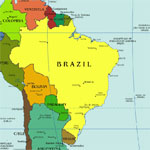
- In the fall of 2013, Vice-President Research Dr. Crago led the Premier of Nova Scotia and a delegation on a visit Pontifical Catholic University of Rio Grande do Sul, exploring how that university developed its technology park to fund research and student scholarships. (Rector Joaquim Clotet Marti was at installation.)
- Some current collaborations include a joint-research project in Physics and Atmospheric Science; multiple research grants through the Research Foundation of the State of Sao Paulo (two in computer science, one in oceanography); and two visiting research awards for faculty members in biology (w/ the Federal University of Rio Grande) and environmental sciences (w/ the Federal University of Santa Catarina). All of these projects are supported by research funding from government agencies in Brazil.
- Since 2012, Dalhousie’s partnership in a consortium called CALDO has helped bring a growing number students to study at Dal through the Brazil government’s Science Without Borders program. To date, Dal has hosted 77 undergrad students and four PhD students.
- Number of students from Brazil currently studying at Dal: 38
Botswana
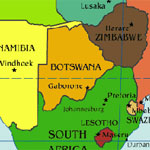 The Faculty of Architecture and Planning’s longstanding relationship with the University of Botswana brought 36 students to Dal to complete degrees in Architecture and, in turn, supported the creation of an architecture program in Botswana. Discussion continues with the University of Botswana (past vice-chancellor, Bojosi Otlhogile, was present for installation) about future collaborations.
The Faculty of Architecture and Planning’s longstanding relationship with the University of Botswana brought 36 students to Dal to complete degrees in Architecture and, in turn, supported the creation of an architecture program in Botswana. Discussion continues with the University of Botswana (past vice-chancellor, Bojosi Otlhogile, was present for installation) about future collaborations.- The “Botswana Architecture Education” project, funded by the Government of Botswana and World University Service Canada (WUSC), provided funding for preparatory academic activities and specialized placements for Botswana students in Dal’s Bachelor of Environmental Design Program from 1993 to 2012 — support totaling more than $3.5 million.
- Number of students from Botswana currently studying at Dal: 6
China
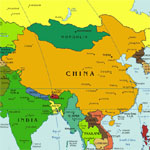 Dal’s relationships with Chinese universities stretch back decades. Currently, there are more than 30 active international agreements in place covering various disciplines, from engineering, to economics, to computer science. These partnerships are with top universities in China as recognized and supported by the Ministry of Education of China (Program 985).
Dal’s relationships with Chinese universities stretch back decades. Currently, there are more than 30 active international agreements in place covering various disciplines, from engineering, to economics, to computer science. These partnerships are with top universities in China as recognized and supported by the Ministry of Education of China (Program 985).- Over the past 15 years, Dal has participated in a range of environmental management and water resource management projects with various Chinese universities, including Xiamen University and Fujian Agricultural and Forestry University. Currently, Dal researchers are partnering with colleagues at China University of Mining & Technology in developing a novel linear generator system, while other researchers have been successful in funding projects through CIHR’s China-Canada Joint Health Research Initiative.
- Dal also frequently hosts visiting scholars from China, with particularly active programs in the School of Business Administration, the Department of Economics, and Community Health & Epidemiology.
- The Department of Oceanography has had research links with Xiamen University and Ocean University of China for more than 20 years.
- Number of students from China currently studying at Dal: 1,107. This is the most of any country other than, of course, Canada: Chinese students make up nearly 6 per cent of Dal’s student population. Dal also has significant Joint Undergraduate Degree Programs (2+2 programs) in areas such as economics and agriculture that bring students to Nova Scotia to complete their degrees.
France
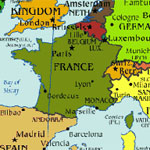 Dal’s partnership with the Research and Higher Education Pole of Brittany (Université Européenne de Bretagne – UEB) involves research collaborations, graduate student training and funding for PhD students. UEB is a key partnership for the North Atlantic Strategic Research Alliance.
Dal’s partnership with the Research and Higher Education Pole of Brittany (Université Européenne de Bretagne – UEB) involves research collaborations, graduate student training and funding for PhD students. UEB is a key partnership for the North Atlantic Strategic Research Alliance.- Dal has an emerging partnership in literature, film studies and social sciences with the Universite Paris 3-Sorbonne Nouvelle (Chancellor Marie-Christine Lemardeley was at installation). The partnership involves proposed research collaborations and three funded summer institutes for researchers and grad students over the next four years; topics will be film studies, defence and security, and digital piracy.
- Number of students from France studying at Dal: 14
Germany
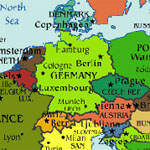 Over the past few years, Dal has developed an extensive relationship with Germany focused on marine sciences and marine affairs. Starting with connections between Dal and the University of Kiel (President Gerhard Fouquet was at installation), as well as between the Halifax Marine Research Institute and GEOMAR, the relationship became more concrete through a joint German-Canadian workshop led by Doug Wallace (now at Dal, then at Kiel) and Dal’s Markus Kienast in 2011.
Over the past few years, Dal has developed an extensive relationship with Germany focused on marine sciences and marine affairs. Starting with connections between Dal and the University of Kiel (President Gerhard Fouquet was at installation), as well as between the Halifax Marine Research Institute and GEOMAR, the relationship became more concrete through a joint German-Canadian workshop led by Doug Wallace (now at Dal, then at Kiel) and Dal’s Markus Kienast in 2011.- Outcomes have included Chancellor Merkel’s visit to Dal in 2012; the Canada-Helmholtz research partnership in “Changes, Risks and Resources in the Oceans”; and two new bilateral graduate schools: ArcTrain Canada/Germany and TOSST/HOSST. (Learn more about TOSST on Dal News.) The partners are considering future funding opportunities for further collaborative projects.
- Number of German students studying at Dal: 21
Israel
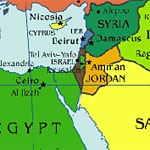 Dal leaders took part in a Nova Scotia trade mission to Israel in November 2011, resulting in a number of new and emerging partnerships. Many of these are focused on technology transfer and innovation.
Dal leaders took part in a Nova Scotia trade mission to Israel in November 2011, resulting in a number of new and emerging partnerships. Many of these are focused on technology transfer and innovation.- Last week (January 21), Dal and Ben-Gurion University signed a new agreement that allows for several different facets of interuniversity collaboration, including pure and applied joint research projects, co-supervision of doctoral students, industry research internships in both countries, joint field courses (in the winter in Eilat and in the summer in Halifax), co-taught courses and major scientific conferences and workshops. The end objective is to create an Ocean Studies Center in Eilat that encompasses scientific and academic programs from both countries.
- Other collaborative work in areas ranging from medical research to waste management is underway at institutions including the Hebrew University of Jerusalem and the University of Haifa.
- Number of students from Israel studying at Dal: 1
Qatar
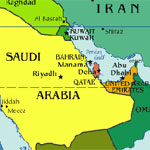 An emerging relationship, Dal’s work with universities in Qatar dates back about four years, when the country’s government hosted a delegation of vice-presidents of research from Atlantic Canadian universities.
An emerging relationship, Dal’s work with universities in Qatar dates back about four years, when the country’s government hosted a delegation of vice-presidents of research from Atlantic Canadian universities.- Dal signed a formal agreement with Qatar University President Sheikha Abdulla Al-Misnad during installation proceedings. Discussions are currently underway about partnerships in two projects: one in oceanography, and one in marine affairs.
- Opportunities are also being explored for Qatar to partner with the Dal-hosted Ocean Tracking Network.
- Number of students from Qatar studying at Dal: 13
United States of America
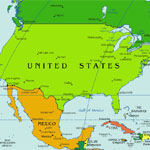 As you might expect, given the proximity and similarities between the countries, there are several major şÚÁĎłÔąĎÍřresearch projects supported by US institutions and agencies, and far too many faculty collaborations to possibly mention.
As you might expect, given the proximity and similarities between the countries, there are several major şÚÁĎłÔąĎÍřresearch projects supported by US institutions and agencies, and far too many faculty collaborations to possibly mention.- Dal receives an average of just under $4 million in research funding from U.S. institutions, companies and agencies each year.
- Dal is increasingly focusing recruitment efforts on the U.S., particularly in New England.
- Number of students from the US studying at Dal: 142

